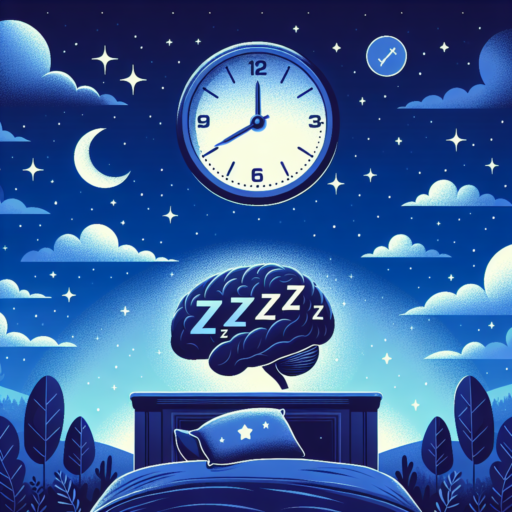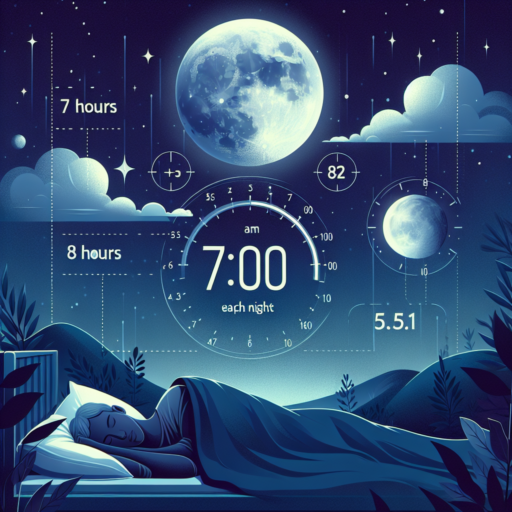Understanding Deep Sleep: What Is It?
Deep sleep, also known as slow-wave sleep, is a vital part of the sleep cycle that plays a crucial role in our overall health and wellbeing. During this stage, our brain waves slow down significantly, which makes it harder for us to be awakened. It is during deep sleep that the body performs most of its healing and restoration processes, including muscle growth, tissue repair, and the strengthening of the immune system.
One of the key benefits of deep sleep is its role in memory consolidation. This stage of sleep is critical for processing and storing new information from the day, helping to convert short-term memories into long-term ones. Without sufficient deep sleep, our cognitive functions, such, as the ability to learn, concentrate, and make decisions, can be significantly impaired.
Another important function of deep sleep is the release of growth hormones in children and young adults, which is essential for growth and development. This hormone also helps build muscle mass and repair cells and tissues in people of all ages. Accordingly, deep sleep not only supports physical growth but also plays a crucial role in maintaining general health and wellbeing.
How Much Deep Sleep Do You Really Need?
Understanding the amount of deep sleep you require is pivotal for maintaining optimal health and well-being. Deep sleep, also known as slow-wave sleep, plays a critical role in physical recovery, memory consolidation, and ensuring that your body’s energy levels are replenished for the next day. Most adults need between 1 to 2 hours of deep sleep per night, which accounts for approximately 20% to 25% of their overall sleep.
To gauge whether you’re receiving adequate deep sleep, consider your energy levels and mental clarity during the day. Persistent fatigue and difficulty concentrating can signal insufficient deep sleep. It’s essential to note that while the quantity of sleep is important, the quality of that sleep is equally crucial. Factors such as stress, alcohol consumption, and the use of electronic devices before bedtime can significantly impact the depth and quality of your sleep.
Enhancing your sleep environment and establishing a regular nighttime routine are practical steps you can take to increase the chances of achieving sufficient deep sleep. This includes minimizing noise and light pollution, adhering to a consistent sleep schedule, and engaging in relaxing activities before bed. By prioritizing sleep health, individuals can make meaningful strides toward achieving the recommended amount of deep sleep, thereby enhancing their overall health and quality of life.
The Science Behind Deep Sleep and Its Phases
Understanding the intricacies of deep sleep is crucial for grasping how our bodies and minds rejuvenate overnight. Deep sleep, often referred to as slow-wave sleep (SWS), is characterized by the slow brain waves known as delta waves. This phase is paramount for physical recovery, memory consolidation, and hormonal regulation. But what truly happens during this stage, and how does it impact our overall health?
Deep sleep is divided into several phases, each playing a unique role in our sleep cycle. Initially, as we drift off, we enter the light stages of sleep, progressively moving towards the more profound, restorative stages of deep sleep. During these deep phases, our brain activities slow down, allowing for therapeutic processes to take place. The heart rate decreases, muscles relax, and blood pressure drops, highlighting the body’s shift into a state of profound healing and growth.
The transition between these stages is critical for the brain’s ability to process information accumulated throughout the day. In the deepest phases of sleep, our brains are busy at work, consolidating memories and making sense of the day’s experiences. This is also when the pituitary gland releases growth hormones, essential for cell repair and growth. Therefore, understanding the cycle of deep sleep not only enlightens us on our physical health but also sheds light on cognitive and emotional well-being.
Factors That Influence Your Deep Sleep Duration
Understanding the factors that influence your deep sleep duration is essential for improving sleep quality and overall health. Deep sleep, the most restorative phase of sleep, is vital for memory consolidation, physical recovery, and the regulation of growth hormones. Several elements, both controllable and uncontrollable, play a significant role in how much deep sleep you get each night.
Lifestyle Choices
The choices you make every day significantly impact your deep sleep phases. Regular physical activity, particularly in the morning or afternoon, can deepen your sleep. However, engaging in strenuous exercise too close to bedtime may interfere with your body’s ability to enter deep sleep stages. Similarly, dietary choices such as limiting caffeine and sugar intake, especially in the hours leading up to sleep, can enhance deep sleep duration. The use of electronic devices emitting blue light before bedtime can also suppress melatonin production, a crucial hormone for sleep-wake cycles, thereby reducing deep sleep duration.
Sleep Environment and Habits
Creating an optimal sleep environment is crucial for maximizing deep sleep. This includes maintaining a cool, quiet, and dark room. The use of blackout curtains or eye masks can block out light, while earplugs or white noise machines can help mitigate noise disturbances. Establishing a consistent sleep schedule, even on weekends, supports your body’s circadian rhythm, making it easier to fall into deep sleep. Additionally, a comfortable mattress and pillows tailored to your sleeping position can provide the physical support necessary for uninterrupted deep sleep.
Normal Deep Sleep Amounts by Age Group
Understanding the normal deep sleep amounts by age group is crucial for maintaining a healthy lifestyle. Deep sleep, also known as slow-wave sleep, is essential for physical recovery, memory consolidation, and ensuring overall health and well-being. The amount of deep sleep required can vary significantly across different age groups.
Newborns and Infants (0-3 months)
Newborns and infants generally require the most sleep among all age groups, with deep sleep making up a substantial portion of their sleep cycle. It’s crucial for their development and growth. Experts recommend that newborns ideally spend about 14 to 17 hours sleeping over a 24-hour period, with a significant portion being deep sleep.
Children and Teenagers (3 years – 18 years)
For children aged 3 to 5 years, 10 to 13 hours of sleep is advised, wherein deep sleep encompasses a vital part of their overall sleep. Moving into the teenage years, the recommended amount decreases slightly to 8 to 10 hours, yet deep sleep remains an integral component for supporting their rapid physical and mental development.
How to Track Your Deep Sleep: Tools and Techniques
Understanding and tracking your deep sleep is pivotal for ensuring your body gets the rest it requires for recovery, memory consolidation, and various other essential processes. Thanks to advancements in technology and research, there are numerous tools and techniques available that can help you get accurate insights into your sleep patterns, particularly the quality of your deep sleep.
Among the most popular and effective tools for tracking deep sleep are wearable devices. These devices are equipped with sensors that monitor your heart rate, movement, and sometimes even your oxygen levels while you sleep. Brands like Fitbit, Garmin, and Apple offer sleep tracking features in their smartwatches and fitness trackers. They use sophisticated algorithms to estimate the amount of time you spend in each sleep stage, including deep sleep. For those driven by data, these devices provide a convenient and insightful way to monitor sleep health.
Another technique for tracking deep sleep involves the use of dedicated sleep tracking apps. These apps can be used independently or in conjunction with wearable devices, providing detailed analysis and personalized recommendations to improve sleep quality. Apps like Sleep Cycle and Sleep As Android leverage the capabilities of your smartphone to monitor sleep stages, detect snoring, and even record sleep talking. They analyze your movements and sounds to precisely track when you fall into deep sleep, and some offer features like smart alarms to wake you up during your lightest sleep phase.
In addition to technology-driven solutions, maintaining a sleep diary is a simple yet effective technique to track your sleep patterns. By documenting the time you go to bed, the time you wake up, and any awakenings during the night, you can gain insights into your sleep habits and identify patterns that might be affecting your deep sleep. This method, although more subjective, can be incredibly valuable when used alongside wearable devices or apps, offering a comprehensive overview of your sleep health.
Improving Your Deep Sleep: Practical Tips and Tricks
Getting a good night’s sleep is essential for maintaining optimal health and well-being. However, achieving deep, restorative sleep can sometimes be challenging. Understanding how to enhance the quality of your deep sleep is beneficial, as it can significantly impact your mood, energy levels, and overall health. Here are some practical tips and tricks designed to help you improve your deep sleep and wake up feeling refreshed and rejuvenated.
Establish a Consistent Sleep Schedule
One of the most effective strategies for improving deep sleep is to maintain a consistent sleep schedule. Going to bed and waking up at the same time every day, including weekends, helps regulate your body’s internal clock. This consistency makes it easier to fall asleep and promotes more restful, undisturbed sleep cycles. Start by setting a realistic bedtime that allows for at least 7-9 hours of sleep, and make this a non-negotiable part of your daily routine.
Optimize Your Sleep Environment
Creating an environment conducive to sleep is key to enhancing deep sleep. Your bedroom should be cool, dark, and quiet to signal to your body that it’s time to wind down. Consider investing in blackout curtains or a white noise machine to block out light and noise. Additionally, ensure your mattress and pillows are comfortable and supportive, as this can have a significant impact on your ability to achieve deep sleep.
Limit Exposure to Screens Before Bedtime
In today’s digital age, it’s common to use smartphones, tablets, or watch television right before bed. However, the blue light emitted by these devices can interfere with your natural sleep cycle by suppressing the production of melatonin, a hormone that promotes sleep. To enhance your deep sleep, limit exposure to screens at least an hour before bedtime. Opt for more relaxing activities, such as reading a book or taking a warm bath, to help your body prepare for rest.
Common Myths About Deep Sleep Debunked
Deep sleep, an integral part of our sleep cycle, is often surrounded by misconceptions that can confuse the understanding of its importance. This phase of sleep is crucial for physical restoration, memory consolidation, and ensuring overall health and well-being. However, several myths distort the reality of deep sleep, leading to common misconceptions.
One prevalent myth is that the more deep sleep you get, the better. While deep sleep is essential, achieving a balance in the sleep cycle is equally important. The body cycles through various stages of sleep, including REM and light sleep, each serving unique purposes for our health. An excess of deep sleep over other stages could indicate underlying health issues rather than an optimal sleep pattern.
Another myth asserts that adults need less deep sleep than children. While it’s true that the proportion of deep sleep decreases with age, this does not diminish its importance for adult health. Adequate deep sleep supports cognitive function, emotional regulation, and physical health, regardless of age.
Lastly, the idea that you can ‘catch up’ on deep sleep over weekends is misleading. Sleep does not work as a bank where debts can be repaid at convenience. Regular, consistent sleep schedules are vital for ensuring the body can cycle through all sleep stages, including deep sleep, effectively. An occasional extra hour of sleep may temporarily ease the feeling of sleep deprivation but cannot reverse the effects of consistent sleep deficiencies.
Understanding the realities of deep sleep goes a long way in promoting healthier sleep habits and overall well-being. Dispelling these myths is the first step towards appreciating the complex nature of sleep and its significant impact on our daily lives.
The Impact of Deep Sleep on Health and Well-being
Deep sleep plays a critical role in our overall health and well-being. This phase of sleep, also known as slow-wave sleep, is essential for physical and mental restoration. During deep sleep, the body repairs itself, building bone and muscle, and strengthening the immune system. This restorative process is vital for energy recovery and maintaining a healthy balance in our bodily functions.
One of the most significant impacts of deep sleep is on our mental health. Studies have shown that adequate deep sleep improves cognitive functions, including memory, problem-solving skills, and concentration. Moreover, deep sleep has a profound effect on emotional and psychological well-being. It helps to regulate mood swings, decrease anxiety levels, and enhance overall emotional stability. The lack of deep sleep, conversely, has been linked to a variety of mental health issues, including depression, irritability, and an increased stress response.
Deep sleep also plays a crucial role in regulating metabolic functions and maintaining cardiovascular health. During deep sleep, the body regulates the hormones that control appetite, which can help in weight management and reduce the risk of obesity. Furthermore, deep sleep contributes to lower blood pressure and reduced heart rate, which are critical factors in preventing heart diseases and stroke.
The connection between deep sleep and well-being is undeniable. Ensuring that we get enough quality deep sleep is fundamentally important for maintaining a healthy lifestyle. While the challenges of contemporary life sometimes make it difficult to prioritize deep sleep, understanding its powerful impact on our health can motivate us to adopt better sleep habits.
No se han encontrado productos.
When to Be Concerned About Your Deep Sleep Levels
Sleep plays a pivotal role in our overall health, with deep sleep being a significant component that aids in the restoration of the body and mind. However, there are circumstances under which individuals should pay closer attention to their deep sleep levels. Understanding these indicators can help maintain a balanced and healthy lifestyle.
Significant Alterations in Sleep Patterns: Experiencing drastic changes in how much deep sleep you’re getting can be a red flag. A consistent lack of deep sleep, characterized by difficulty in falling asleep or staying asleep long enough to enter deep sleep phases, can lead to several health issues, including decreased cognitive function and a weakened immune system.
Persistent Fatigue and Daytime Sleepiness: Feeling tired after waking up or suffering from excessive drowsiness during the day can indicate insufficient deep sleep. This stage of sleep is crucial for energy restoration; thus, missing it can severely impact your daily performance and alertness.
Increased Stress and Mood Changes: Another sign to be cautious about your deep sleep levels is a noticeable shift in your mood and stress levels. Deep sleep contributes to emotional and mental health. A deficiency can lead to heightened stress, irritability, and even depression.




